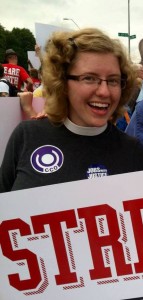The Importance of Taking Back the Night – Emily Ewing
Many colleges and communities around the country hold annual Take Back The Night (TBTN) events. These events are aimed at taking back power to be in public at night. Recognizing that many women and men experience sexual violence at night, Take Back the Night works to reclaim that space that is so often violated and to stop sexual violence in all its many forms.
—–
People choose to do community organizing for a lot of different reasons. Some people choose for personal reasons, some people do it for their families; some people do it for other reasons. For Andrea H. it was a class assignment.
The assignment was to “organize something that pushed personal boundaries.” The more uncomfortable you were, the better the grade. Andrea had helped organize TBTN with her friend Ashley for 4 years already at that point and before that she had attended as well as helped with day-of tasks. Her usual approach to Take Back The Night was behind the scenes. Andrea would keep track of who would speak and when, coordinate candles, prepare posters for the march, etc. In general, her work in organizing was in the background. She would fundraise, support others, and take care of the details. This time, the assignment was to push her boundaries.
When she went to TBTN that year, Andrea didn’t know that it would be the assignment until after she had done it and was in class hearing about other people’s assignments.
In the process for organizing, there was an extra spot. Not enough people had signed up to share. Andrea was with a couple friends, one of whom knew Andrea’s story and asked why Andrea didn’t fill the open space. Andrea said that wasn’t what she was there for.
Ashley came over and asked if she knew of anyone who had a story or a poem they could share. Ashley needed somebody and so, Andrea “just did it.” People talk of being called, something pushing them to do something they don’t want to. Andrea is clear that God pushed her to speak. She doesn’t know if anybody was touched by the story, but understands it to be a breakthrough in her healing. Maybe that was why God was pushing her.
Even with God pushing her, she was still afraid. Andrea doesn’t know why she was afraid—maybe because she hadn’t ever shared it with anyone before, or that she hadn’t really prepared anything, or maybe just because she hates public speaking. That, perhaps, was the magic of that Take Back The Night.
Andrea was afraid as she thought about sharing her story and the poem she had written when she was 12. She’d told her story before, to individuals, to some groups. Her story had been used in “Voices against Violence” as a way to share stories safely. This wasn’t the first time she had shared her story, but somehow it was different. This was her sharing her story in front of 700 people. It was a different kind of organizing and public speaking than she’d done before. It wasn’t sharing someone else’s story. It wasn’t talking about an issue. It was personal. Andrea was afraid, and had good reason to be. Yet even in her fear, she did it.
Andrea got up, shared her story of what had happened, and then shared the poem she had written when she was younger.
“8 years old”
Cafeteria. Blacking Out.
Holding tight. Do not drop.
Walking out.
The friend to tell. The friend to save.
The teacher who stood out.
Teachers educate.
Teachers transform.
Teachers wound.
Sometimes gain. Sometimes lose.
Lessons I should not had to learn.
Time must heal those wounds.
When she was done, she remained where she was for what felt like an hour, wondering if she should say anything else. When she decided she was done, and began to walk off, applause and words of gratitude followed her off the stage.
It’s really hard to call yourself a survivor, because you automatically out yourself, everyone will ask questions, and you shouldn’t have had to be a “survivor” in the first place. Beforehand, she didn’t feel like she had to talk about what had happened, didn’t feel like she needed to be one who survived. That night, sharing her story and her poem, she realized that she really had survived something. She finally felt like a survivor, in a powerful sense.
So why organize? Andrea did TBTN for years and never felt the need to share her story. People would ask why she participated and why she helped—why she was passionate about TBTN.
There are so many people with stories from their lives that move us to want to fight more. How does anyone’s individual story become action or make change? But what is to say that your story won’t move another person to share their story and another and another? At some point it becomes better to share than to keep it in. Sharing stories and taking action create community. They keep survivors from thinking they are the only ones.
Emily E. Ewing is a native of Colorado and a graduate of Luther College, Decorah, IA. She served her year-long internship at Immanuel Lutheran Church, Kansas City, and has returned to the Lutheran School of Theology at Chicago, where she is pursuing a Master of Divinity degree. She is a candidate for ordination to the Ministry of Word and Sacrament in the ELCA. Emily notes that this is not her story but one that has been entrusted to her. The person who told this story is real, and the name Andrea H. is a pseudonym.


